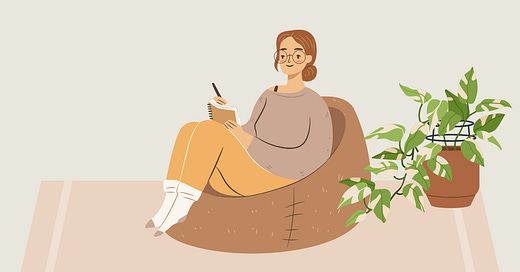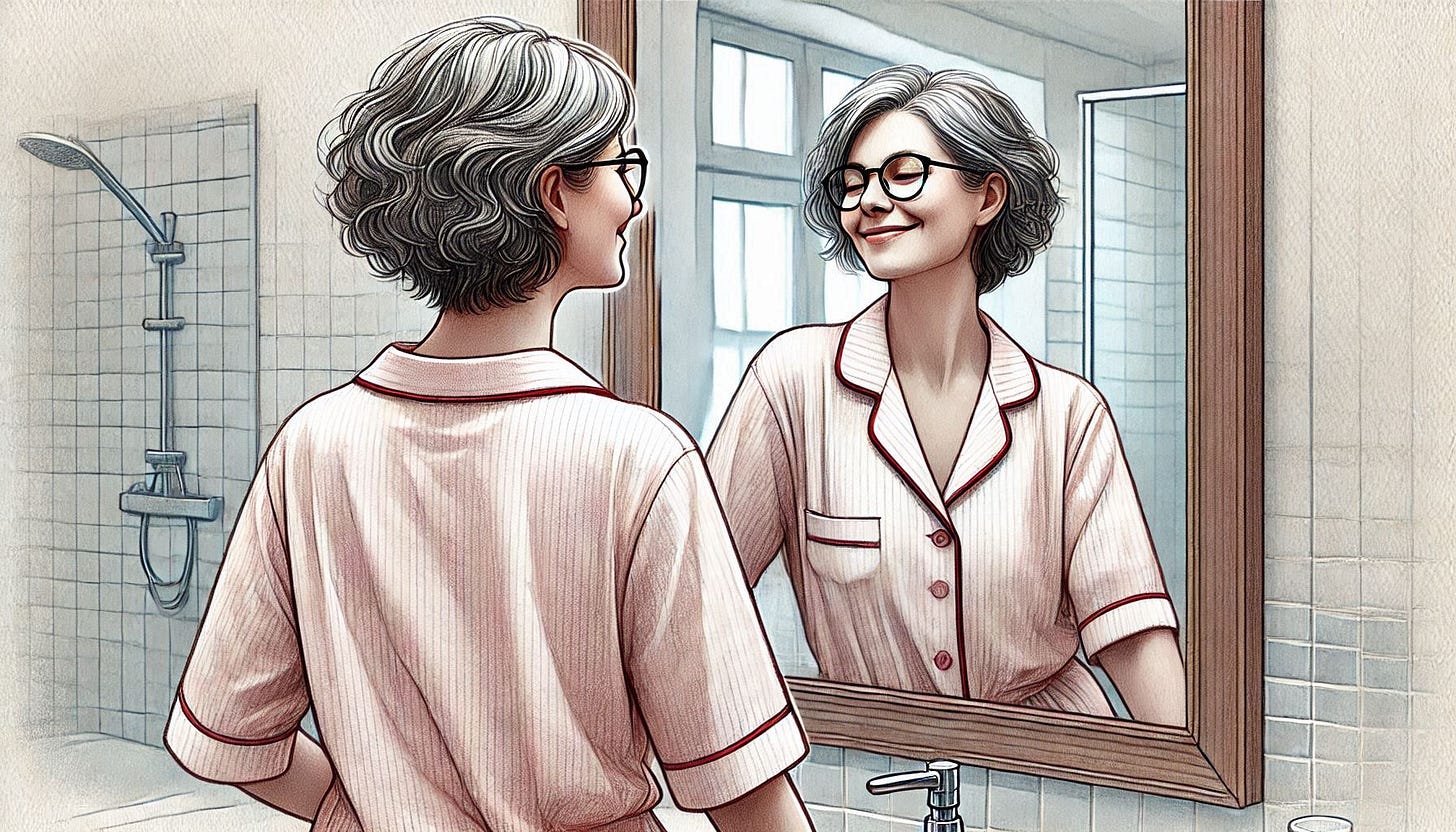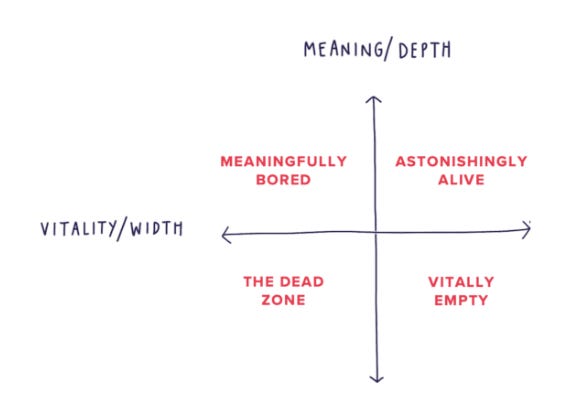"Pre-gretting"
122: This is the kind of thing that's going to make you want to change something.
How many books have you read and thought, “That was a good one!” but can’t remember much of it later? Yep, I’ve got a few of those on my Kindle, too.
For a few months now, though, I’ve been reading a book I don’t want to speed through. I want to linger in it, not for its prose or poetry. I want to absorb what it’s saying. I want to allow it to change me. D’you know what I mean?
The jigsaw puzzle was missing a piece.
Since I hit midlife, I’ve been focused on filling the second half of my life with meaning and purpose. I figured this would be my bulwark, you know, against midlife crisis or that kind of depression many people feel whenever they pay too much attention to their age or disappearing youthful looks.
The thought was that if I had meaning in my life, none of that would matter. I would always have a reason to get up in the morning. Where’s the next mountain to climb? Charge!
For the most part, my thinking was on point. But when I picked up Jodi Wellman’s book, You Only Die Once, I discovered a missing and crucial piece. I not only want the rest of my life to be purposeful and meaningful, but I also want it to be vibrant — or, to use Wellman’s words, “astonishingly alive.”
It appears I may have been over-indexing on the meaning axis and not paying enough attention to the vitality axis. With flashing neon lights, I realized I was borderline “meaningfully bored.” Eeek. 1
Getting to the best corner
Wellman’s book is really about getting us to the “astonishingly alive” upper right-hand corner of the quadrant and staying there! And I’m all in.
There’s this one section in the book that rang a few bells for me. It focused on what Wellman calls “pre-grets” — an exercise in anticipating our regrets before they become permanent plot lines in our life story. The goal? To avoid what she describes as “the crestfallen ‘if only’ grimace that trails off into a somber silence.” We want to catch those potential regrets while we can still do something about them.
The exercise is simple: Imagine yourself on your deathbed today, with just a few hours remaining. You're not in pain; you’re lucid, at peace, and (Wellman emphasizes) “looking fabulous.” Now, what would you regret?
The key in this exercise is to focus not on things you did and wish you hadn't (regrets of commission) but on the things you never did at all (regrets of omission). The chances not taken, the mischief not managed, the audacious dreams left dangling.
As Wellman puts it,
“We can rationalize our regrets of commission through the softening of time, but regrets of omission tend to haunt us, mostly because these paths not taken shine a glazing spotlight on the chasm between our actual selves and the person we've imagined as our ideal selves — the version of us that make dreams and goals come true and live their shit together in general.”
When I first sat down with pen and paper to do this exercise, I couldn’t think of anything to write. Not because I had nothing to regret! I was afraid to admit, even to myself, all the things I may already be regretting, even TODAY. But slowly, the pen moved and soon enough, a list formed.
Here are a few of what came out of it:
I would regret not dancing as much and as often as I could.
I would regret not taking care of my body, treating it like it was invincible.
I would regret the times I became my own worst enemy, sabotaging my dreams because what if I fail?
I would regret not trying because what if I looked foolish and people laughed at me?
I would regret never allowing myself to be fully supported by others because I was too afraid to show vulnerability or ask for help.
Looking at my list and except for some outliers, a pattern emerged. And really, I wasn’t surprised by what I saw because it is the thing I’ve always been working to overcome. The fear of rejection, of judgment, of falling flat on my face and looking foolish.2 But if I want to live vibrantly — astonishingly alive, mind — I’m really going to have to befriend that fear and wink at it and say, “Watch while I do this!”
They’re not final… yet!
The beautiful thing about pre-grets is that, unlike real regrets, they come with an invitation to change. My list isn’t just a catalog of potential disappointments — it’s a call to action. These aren’t mistakes I’ve already made set in stone; they are opportunities to write myself a better story.
There’s no statute of limitations on trying something new (and maybe looking foolish, but who cares?!). And, thankfully, I can still dance!
As Wellman reminds us,
“The Grim Reaper happens to all of us, but we're responsible for the regrets we let pile up.”
It’s up to us. We can choose to be the main character in our own story. No matter how scary that might sound. No, we can’t control much in life. But we can control how we live it.3
The power of examining our pre-grets lies not in the exercise itself but in what we choose to do with these insights. This list will serve as my persistent nudge toward living with more color in 2025. I will use it as a nagging reminder to take more chances and maybe let out that slightly mischievous spirit that's been itching to emerge. 😉
Because in the end, the best way to avoid regrets isn't to play it safe.
It's to live with such boldness that even our mistakes become part of a great story worth telling. And isn't that what we're really after? Not just a life well-lived, but a life well-storied — full of adventures, a healthy sprinkling of mischief, and marked by the kind of audacity that makes people lean in and say, “Tell me more.”
• • •
What about you? If you imagined yourself on your deathbed today, what’s one pre-regret you might have — something you could still change? If you could make one bold choice or try something new, what would it be?
🏷 A Fulfilling Life
💭 muse
“The ultimate success metric is whether you get what you want out of life. But that’s harder than it sounds because it’s easy to try to copy someone who wants something you don’t.” — Morgan Hausel
🍹 reader shout-out
A warm shout-out to WAGO reader
, who writes the fantastic column 50+ is Prime of Life. Really, the title of her publication says it all, and you should have a look and check it out!💬 last word
I know lots of people will debate me on this, but I stand by it: 80s music is the best!
I mean, seriously.
May the odds be ever in your favor,
Lou Blaser
I’m in good company, though. Wellman’s research revealed about 40% of people feel “meaningfully bored.” We’re doing ok on purpose and meaning but lacking in the zest department. And only 8% counted themselves as “astonishingly alive.”
Once upon a time, I thought by the time I got to 50, I’d be past these fears of rejection or looking foolish. Hah! I don’t think we ever fully outgrow them. We just learn to face them with a little more courage — or maybe a lot more humor.
That entire paragraph is really me talking to myself and giving me a rah-rah.








thanks for this good reminder we all need. And introducing the book and sharing some insights and sharing some of your inner-works based on that book. Sounds like a book worth reading and reflecting on.
Lou, I find the Power of Regret a powerful tool and motivator.
What drives me is to avoid the number one regret of people on their deathbed: I didn't live the life that was right for me. I didn't go for it.
NFW for me!
To avoid that regret (and this is aligned with what you wrote), I came up with the concept of writing a thank you note from your (much) older self to your current self. It's thanking you for all the things you do now, and until then, that led to being grateful for the life you've led.
This forces you to identify what you want your life to be and feel like and connects you to the regret you'll have if you don't.
It works!
Great article, Lou. Thank you.